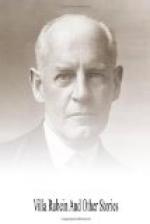Mr. Treffry waved it from him: “Not for me,” he said: “Wish I could! They won’t let me look at it.” And walking over, to the window with a heavy tread, which trembled like his voice, he sat down. There was something in his gait like the movements of an elephant’s hind legs. He was very tall (it was said, with the customary exaggeration of family tradition, that there never had been a male Treffry under six feet in height), but now he stooped, and had grown stout. There was something at once vast and unobtrusive about his personality.
He wore a loose brown velvet jacket, and waistcoat, cut to show a soft frilled shirt and narrow black ribbon tie; a thin gold chain was looped round his neck and fastened to his fob. His heavy cheeks had folds in them like those in a bloodhound’s face. He wore big, drooping, yellow-grey moustaches, which he had a habit of sucking, and a goatee beard. He had long loose ears that might almost have been said to gap. On his head there was a soft black hat, large in the brim and low in the crown. His grey eyes, heavy-lidded, twinkled under their bushy brows with a queer, kind cynicism. As a young man he had sown many a wild oat; but he had also worked and made money in business; he had, in fact, burned the candle at both ends; but he had never been unready to do his fellows a good turn. He had a passion for driving, and his reckless method of pursuing this art had caused him to be nicknamed: “The notorious Treffry.”
Once, when he was driving tandem down a hill with a loose rein, the friend beside him had said: “For all the good you’re doing with those reins, Treffry, you might as well throw them on the horses’ necks.”
“Just so,” Treffry had answered. At the bottom of the hill they had gone over a wall into a potato patch. Treffry had broken several ribs; his friend had gone unharmed.
He was a great sufferer now, but, constitutionally averse to being pitied, he had a disconcerting way of humming, and this, together with the shake in his voice, and his frequent use of peculiar phrases, made the understanding of his speech depend at times on intuition rather than intelligence.
The clock began to strike eleven. Harz muttered an excuse, shook hands with his host, and bowing to his new acquaintance, went away. He caught a glimpse of Greta’s face against the window, and waved his hand to her. In the road he came on Dawney, who was turning in between the poplars, with thumbs as usual hooked in the armholes of his waistcoat.
“Hallo!” the latter said.
“Doctor!” Harz answered slyly; “the Fates outwitted me, it seems.”
“Serve you right,” said Dawney, “for your confounded egoism! Wait here till I come out, I shan’t be many minutes.”
But Harz went on his way. A cart drawn by cream-coloured oxen was passing slowly towards the bridge. In front of the brushwood piled on it two peasant girls were sitting with their feet on a mat of grass—the picture of contentment.




